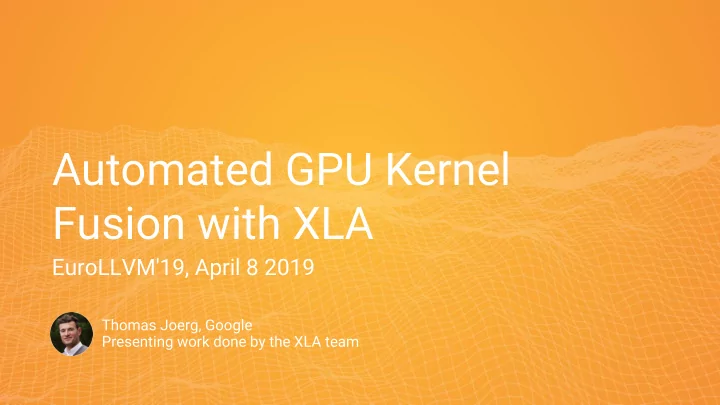

Automated GPU Kernel Fusion with XLA EuroLLVM'19, April 8 2019 Thomas Joerg, Google Presenting work done by the XLA team
Outline ● TensorFlow ● Kernel fusion ● XLA compiler ● Automated kernel fusion
Example: ResNet block ReLu := max(input, 0.0) Relu Element-wise Addition 0 Add Fused Batch Normalization Convolution
Fused Kernels ● Convenient ● Performant
// Compute a * x + y. // a is a scalar, x and y are tensors. tmp = tf.multiply(a, x) out = tf.add(tmp, y)
// Compute a * x + y. // a is a scalar, x and y are tensors. tmp = tf.multiply(a, x) out = tf.add(tmp, y) __global__ void Multiply(int n, float a, float* x) { int i = blockIdx.x * blockDim.x + threadIdx.x; if (i < n) x[i] = a * x[i]; }
// Compute a * x + y. // a is a scalar, x and y are tensors. tmp = tf.multiply(a, x) Tensors read + written: 4 out = tf.add(tmp, y) 0 __global__ void Multiply(int n, float a, float* x) { int i = blockIdx.x * blockDim.x + threadIdx.x; if (i < n) x[i] = a * x[i]; } __global__ void Add(int n, float* x, float* y) { int i = blockIdx.x * blockDim.x + threadIdx.x; if (i < n) x[i] = x[i] + y[i]; }
// Compute a * x + y. // a is a scalar, x and y are tensors. tmp = tf.multiply(a, x) out = tf.add(tmp, y) __global__ void FusedMulAdd(int n, float a, float* x, float* y) { int i = blockIdx.x * blockDim.x + threadIdx.x; if (i < n) x[i] = a * x[i] + y[i]; }
// Compute a * x + y. // a is a scalar, x and y are tensors. out = tf.fused_multiply_add(a, x, y) Tensors read + written: 3 0 25% reduction! __global__ void FusedMulAdd(int n, float a, float* x, float* y) { int i = blockIdx.x * blockDim.x + threadIdx.x; if (i < n) x[i] = a * x[i] + y[i]; }
Fused Kernels ● Convenient ● Performant But ● Development cost ● Inflexibel ● Hard to optimize
Submitter Hardware Chip count Software ResNet-50 v1.5 * NVIDIA DGX-1 8 ngc18.11_MXNet, 65.6 (on premise) cuDNN 7.4 Google 8x Volta V100 8 TF 1.12, cuDNN 64.1 (Cloud) 7.4 Full results: https://mlperf.org/results/ * speedup relative to reference implementation
Example: ResNet block Relu Add
TensorFlow with XLA TPU GPU TensorFlow Model TensorFlow Graph CPU XLA Intermediate Representation: HLO Target-specific code generation HLO Fusion happens here! XLA target-independent & target-specific optimizations
HLO IR Sample HLO ops Sample data types Elementwise math ● Primitive types ● Add, Tanh, Map ○ PRED ○ Spezialized math for neural nets ● F16 ○ Dot, Convolution, Reduce ○ F32 ○ Re-organize data ● Composite types ● Reshape, Broadcast, Concat, Tuple ○ array: F32[2,3], F16[] ○ Control flow ● tuple: TUPLE(F32[16], F16) ○ While, Call, CustomCall ○ Data transfer ● Parameter, Constant ○
ReLu in HLO Operation Type Shape
HLO Fusion
HLO Fusion ● Reduce memory bandwidth ● Compatible loop pattern ● Coalesced memory access
HLO Fusion 1) Fusion (with duplication) A A’ A’’ 2) Sibling fusion 3) Fusion with multiple outputs B C B C
HLO Fusion 1) Fusion (with duplication) A A 2) Sibling fusion 3) Fusion with multiple outputs B C B C
HLO Fusion A 1) Fusion (with duplication) A 2) Sibling fusion B 3) Fusion with multiple outputs B C C
Example: ResNet block Relu Add
Fused Add + ReLu __global__ void fusion(float *lhs, float *rhs, float* output) { int i = blockIdx.x * blockDim.x + threadIdx.x; if (i < 128*512*28*28) { output[i] = } }
std::function<llvm::Value*>(const IrArray::Index& index) MakeElementGenerator(const HloInstruction* hlo, HloToElementGeneratorMap& operand_to_generator) { switch (hlo->opcode()) { case HloOpcode::kMaximum: return [...](const IrArray::Index& index) { llvm::Value* lhs = operand_to_generator.at(hlo->operand(0))(index); llvm::Value* rhs = operand_to_generator.at(hlo->operand(1))(index); auto cmp = b->CreateFCmpUGE(lhs, rhs); return ir_builder_->CreateSelect(cmp, lhs, rhs); }; ... }
Fused Add + ReLu __global__ void fusion(float *lhs, float *rhs, float* output) { int i = blockIdx.x * blockDim.x + threadIdx.x; if (i < 128*512*28*28) { max(0.0, ); lhs[i] + rhs[i] output[i] = } }
Reduction 1 i = blockIdx.x * blockDim.x + threadIdx.x; kTileSize y_in_tiles = i / width; x = i % width; for (int j = 0; j < kTileSize: ++j) { y = y_in_tiles * kTileSize + j; if (y < height) { partial_sum += generator(y, x); } sum reduction } atomicAdd(&output[x], partial_sum);
Multi-output fusion i = blockIdx.x * blockDim.x + threadIdx.x; y_in_tiles = i / width; x = i % width; for (int j = 0; j < kTileSize: ++j) { y = y_in_tiles * kTileSize + j; if (y < height) { partial_sum[0] += generator[0](y, x); partial_sum[1] += generator[1](y, x); } } atomicAdd(&output[0][x], partial_sum[0]); atomicAdd(&output[1][x], partial_sum[1]);
i = blockIdx.x * blockDim.x + threadIdx.x; y_in_tiles = i / width; x = i % width; for (int j = 0; j < kTileSize: ++j) { y = y_in_tiles * kTileSize + j; if (y < height) { partial_sum[0] += generator[0](y, x); partial_sum[1] += generator[1](y, x); partial_sum[2] += generator[2](y, x); output[3][y, x] = generator[3](y, x); } } atomicAdd(&output[0][x], partial_sum[0]); atomicAdd(&output[1][x], partial_sum[1]); atomicAdd(&output[2][x], partial_sum[2]);
Thank you! Questions? XLA documentation https://www.tensorflow.org/xla/overview Public XLA mailing list xla-dev@googlegroups.com XLA on Github https://github.com/tensorflow/tensorflow/tree/master/tensorflow/compiler
Recommend
More recommend